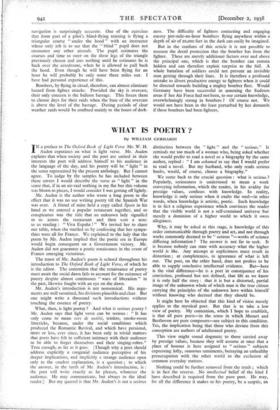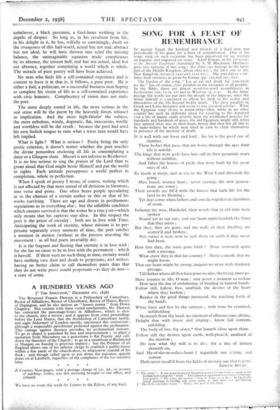WHAT IS POETRY
By WILLIAM GERHARDI
IN a preface to The Oxford Book of Light Verse Mr. W. H.
Auden expatiates on what is light verse. Mr. Auden explains that when society and the poet are united in their interests the poet will address himself to his audience in the language of the day, and his poetry will be " light " in the sense represented by the present anthology. But I cannot agree. To judge by the samples he has included between these covers I would describe the verse as " light " in the sense that, if in an air-raid nothing in my flat but this volume was blown to pieces, I would consider I was getting off lightly.
Mr. Auden is the author who wrote a long poem to the effect that it was no use writing poetry till the Spanish War was over. A friend of mine held a copy called Spain in his hand as we entered a popular restaurant together, and so conspicuous was the title that an unknown lady signalled to us across the restaurant and then sent a note to us reading : " Viva Espaiia ! " We invited her to share our table, when she startled us by confessing that her sympa- thies were all for Franco. We explained to the lady that the poem by Mr. Auden implied that the poetic era in Europe would begin consequent on a Government victory. Mr. Auden did not guarantee a poetic renaissance in the event of Franco emerging victorious.
The tenor of Mr. Auden's poem is echoed throughout his introduction to The Oxford Book of Light Verse, of which he is the editor. The contention that the renaissance of poetry must await the social dawn fails to account for the existence of poetry despite almost continuous " wars of liberation " in the past, likewise fought with an eye on the dawn.
Mr. Auden's introduction is not nonsensical. His argu- ments are well sustained, his divisions plausible and clear. But one might write a thousand such introductions without touching the essence of poetry.
What, then, is light poetry ? And what is serious poetry ? Mr. Auden says that light verse can be serious : " It has only come to mean vers de societi, triolets, smoke-room limericks, because, under the social conditions which produced the Romantic Revival, and which have persisted, more or less, ever since, it has been only in trivial matters that poets have felt in sufficient intimacy with their audience to be able to forget themselves and their singing-robes." True enough, as far as it goes. (Though why a poet should address explicitly a congenial audience perceptive of his deeper implications, and implicitly a strange audience open only to the crudest explanation, is a question ; to which the answer, in the teeth of Mr. Auden's introduction, is : the poet will write exactly as he pleases, whatever the audience. He may communicate, but always to the ideal reader.) But my quarrel 'is that Mr. Auden's is not a serious distinction between the " light " and the " serious." It reminds me too much of a woman who, being asked whether she would prefer to read a novel or a biography by the same author, replied : " -I am ashamed to say that I would prefer to read a novel. But my husband, who only reads serious books, would, of course, choose a biography."
We come back to the crucial question : what is serious ? Popularly, seriousness is understood to mean a work conveying information, which the reader, in his avidity for prestige values, confuses with knowledge. In reality, knowledge is only serious when it exalts the soul—in other words, when knowledge is artistic, poetic. Such knowledge is in fact a religious experience which convinces the reader that the visible world is not a self-contained universe but merely a dominion of a higher world to which it owes allegiance.
Why, it tray be asked at this stage, is knowledge of this order communicable through poetry and art, and not through works commonly deemed to be " serious "—works of science diffusing information ? The answer is not far to seek. It is because nobody can state with accuracy what the higher world is like. Any attempt at explicitness must result in distortion ; at completeness, in ignorance of what is left out. The poet, On the other hand, does not profess to be able to supply conclusive intellectual evidence. But—here is the vital difference=he is a poet in consequence of his conviction, profound but not defined, that life as we know it is only half the story : that it is but a distorted, partial image of the unknoWn whole of which man is the true citizen carrying the principles of the unknown laws within himself without knowing who decreed that they should be.
It might here be objected that this kind of vision merely applies to the mystical poet. But that is to take a low view of poetry. My contention, which I hope to establish, is that all pure poets—in the sense in which Mozart and Beethoven are pure composers—are subjeCt to this condition. Yes, the implication being that those who deviate from this conception are authors of adulterated poetry.
This view might sound dogmatic to those carried away by prestige values, becauk they will assume at once' that a place of. honour ,is here assigned to " serious " subjects expressing lofty, sonorous sentiments, betraying an unhealthy preoccupation with the other world, to the exclusion of common everyday matters.
Nothing could be further removed from the truth ; which is in fact the reverse. No intellectual belief of the kind I have described is required from the pure poet. He may, for all' the difference it makes to his poetry, be a sceptic, an unbeliever, a black pessimist, a God-hater writhing in the depths of despair. So long as, in his revulsion from life, in his delight in it, he has, wilfully or unwittingly, dwelt on the strangeness of this half-world, actual but not real, abstract but not ideal, he will have thrown into relief the missing balance, the unimaginable equation made conspicuous by its absence, the unseen half, real but not actual, ideal but not abstract, together completing a world which is whole. The miracle of pure poetry will have been achieved.
No man who finds life a self-contained experience and is content to leave it at that is, it follows, a pure poet. He is either a fool, a politician, or a successful business man hoping to complete his vision of life as a self-contained experience with civic honours. Complacency of vision does not make the poet.
The more deeply rooted in life, the more serious in the real sense will be the poem by the heavenly forces released in implication. And the more high-falutin' the subject, the more nebulous, windy, dogmatic, flat, inaccurate, woolly and worthless will be the result : because the poet had used his own foolish tongue to state what a wiser man would have left implied.
What is light ? What is serious ? Purity being the only poetic criterion, it doesn't matter whether the poet touches the divine penumbra enclosing all life in contemplating a daisy or a Glasgow slum. Mozart is not inferior to Beethoven. It is no less serious to sing the praises of the Lord than to groan aloud that God might bestir Himself and put the world to rights. Each attitude presupposes a world perfect in completion, whole in perfection.
When I speak of poetry I mean, of course, writing which is not affected by that most unreal of all divisions in literature, into verse and prose. One often hears people speculating as to the chances of a certain author or this or that of his works surviving. There are ups and downs in posthumous reputations as in everything else ; but the infallible condition which ensures survival is that the writer be a true poet—which only means that his captives stay alive. In this respect the poet is the priest of eternity : both are in love with Time. Anticipating the work of eternity, whose mission is to per- petuate separately every moment of time, the poet catches a moment in motion (without in the process arresting the movement : as all bad poets invariably do).
It is the fragrant and fleeting that eternity is in love with ; for she has no cause to be in love with the permanent : which is herself. If there were no such thing as time, eternity would have nothing save dust and death to perpetuate, and writers having no better claim to call themselves poets than that they do not write prose would perpetuate—as they do now— a state of coma.



























































 Previous page
Previous page